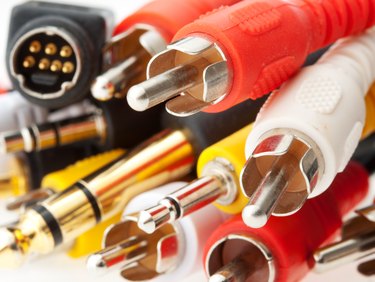
Enjoying pristine audiophile-level sound requires basic maintenance and cleaning procedures. By checking your audio connections on a regular basis for signs of dust and debris, you can prevent corrosion, decrease electrical interference and avoid poor connections caused by contaminants. Proper maintenance -- whether with alcohol or with an audio-industry deoxidizer -- adds years to the life of your audio system and provides you with an unfettered and distortion-free musical experience.
Precautions
Video of the Day
Use cleaning solutions that won't corrode or degrade the performance of the audio connectors. Water-based cleaners or impure solutions of alcohol can impede connections and result in damage to your audio system, as can leaving your system in an area prone to high levels of moisture and humidity. Using an abrasive cleaner on gold-plated and copper connectors can erode the metal over time. Gold-plated connections require special care, because abrasions to the gold plating can expose the underlying metal and increase the potential for tarnish and corrosion. For gold-plated connectors, use a product specifically designed for cleaning gold connectors and apply the product with as little friction as possible.
Video of the Day
Alcohol
Affordable alcohol works well as an audio connector cleaner. Choose a 90-percent or higher solution of high-purity octyl alcohol, which doesn't leave a residue. Don't use rubbing alcohol; it leaves residue behind when it evaporates. Apply the solution with a nonabrasive cloth and gently polish the connector. When using alcohol-based cleaners, keep the solution away from heat and sparks and clean the connectors in a well-ventilated area. After cleaning, leave the connectors unplugged and your system powered off for several hours until the alcohol completely evaporates.
Deoxidizers
Deoxidizers formulated specifically for audio connectors remove oxidation, corrosion and tarnish without affecting other components. Apply a deoxidizer such as Kontak or DeoxIT to the connectors and wait for 10 to 15 minutes. Lightly polish the connectors with a lint-free cloth that is free of contaminants to clean the audio connectors. Deoxidizers remove corrosion, dirt and impurities that would otherwise degrade the audio quality of your system.
Preventing Corrosion
After you clean the connectors, apply protective caps to the connections that you don't use regularly to prevent contamination. Protective caps keep out dust and moisture with a near airtight seal on the connectors. Caps reduce electromagnetic and radio frequency interference, resulting in better quality sound. For active connections, replace old connectors with airtight gas-sealed connectors to reduce the accumulation of dirt, debris and corrosion. Placing your audio system in a protective cabinet can also reduce contamination to the connectors.